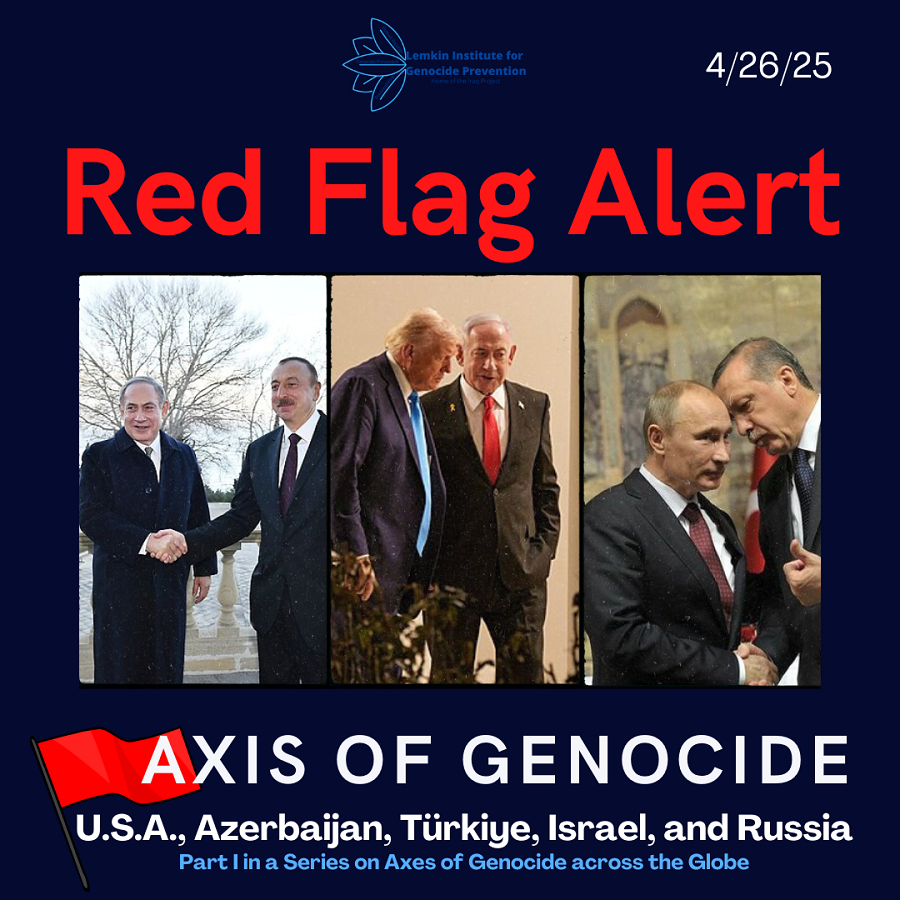Red Flag Alert: Axis of Genocide – U.S.A., Azerbaijan, Türkiye, Israel, Russia & the Era of “Acceptable Genocide”

Message from the Co-Executive Director Over the past four years, the Lemkin Institute for Genocide Prevention and Human Security has observed the emergence of a profoundly destabilizing diplomatic Axis of Genocide that is committing genocide against many different peoples and that threatens to destroy ever more groups in the future. The power of this Axis, and its constituent institutions (including many of the pillars of Western democracy), make its embrace of genocide a catastrophic development for the human species. It may end up becoming history’s greatest challenges to peace. This RFA is the first in a series examining interlocking Axes of Genocide, so if you do not see a country of concern, such as the UAE, Somalia, Iran, or China, addressed here, you can be pretty sure it will be included in future installments. The emergence of this Western-driven Axis of Genocide is the result of our era of New ‘New Imperialism’ (as opposed to the old ‘New Imperialism’ of the late 19th century), as the U.S.A., Russia, and China seek to guarantee influence over a globe whose borders have suddenly become unfrozen again. The dying rules-based order, which established fixed (though often contested) borders between states, reflected an era when the nation-state reigned supreme. That moment is over, and the three global empires are asserting themselves in new and sometimes surprising ways in order to guarantee access to (and domination over) resources and trade routes. The U.S.A.’s rise to the world’s more powerful empire, combined with China’s rapid growth and Russia’s reassertion of hegemony, have made the entire world — and all of its peoples, small and large — fair game for a new Great Game, the immediate impact of which on all of our lives has been revolutionized by new technologies. The epicenter of today’s Great Game is the same as the previous century’s Great Game: Central Asia. We encourage everyone to read Zbigniew Brzezinski’s The Grand Chessboard, which was originally published in 1997. While his foreign policy prescriptions are no longer up-to-date, is book very cogently outlines the imperial stakes of the 21st century and can help clarify confusing new world that we see manifesting around us. Unfortunately, but quite predictably, the genocides of the past — ‘Manifest Destiny’ and all the other murder and displacement processes in the British Empire’s settler colonies, the Herero-Nama genocide of 1904-1914, the Armenian Genocide of 1915-1923, Stalin’s genocides,the Holocaust, the Nakba — are directing the behavior of this Axis. The rule of thumb today appears to be that if a people is ‘in the way’ or otherwise upsetting the smooth enrichment of certain elites, the best thing to do is get rid of them — kill them, ship them off to foreign prisons, force them out of their ancestral lands, and resettle those lands with loyalists. In other words, genocide is becoming acceptable and mundane. Much of our work over the past three years has involved tracking the complexities of this Axis, whose main players are often described as working in opposition to one another rather than in tandem. While the U.S.A. and Russia, for example, are competitors for power and control in Europe and Central Asia, their competition sometimes requires short-term strategic policy alignment. Not unlike 19th century Europe’s approach to the Ottoman Empire, Russia and the USA’s strategic alignment in the South Caucasus set the stage for the Artsakh genocide and is now threatening Armenia proper. Similarly Turkey and Israel, who are famous for very public fights over the cause of Palestinian freedom, frequently work closely together to shore up their respective spheres of influence in the Middle East, to the detriment of Palestinians, Kurds, Armenians, Yezidis, Middle Eastern Christians, and many others. It is important, we believe, that the genocide prevention community, and all people interested in creating a better and more peaceful world for the generations to come, understand this new imperialist dynamic. While it is very similar to nineteenth century New Imperialism, it also is profoundly different, and potentially more catastrophic. Given that the three Great Powers in our multi-polar world are truly global, with centers of gravity that each control large land masses, the number of people, militaries, and armed groups that could be involved in the Great Game is very new. What this means is that the entire world is being drawn into a Great Game with even more volatility and greater concentration. Without the semi-autonomous local and regional economies of the past centuries, this Great Game threatens the total collapse of the world’s supply of food and medicine. Nuclear weapons, AI, and the domination of decision-making by a small group of billionaires with no responsibilities, loyalties, or real commitments, further ensure that any global conflagration, which is already underway in regionally ‘contained’ wars and genocides, will have destructive power that rivals by many times over the destruction of World War II. Although the analysis is grim, we do not mean to be alarmist with our Red Flag Alerts. Our RFAs are meant to bring to public attention the results of our analyses of current events, which we reach by applying our Genocide Prevention Toolbox to the reliable evidence we are able to collect. By going public with these analyses, we always hope that large institutions and powerful people will respond with appropriate measures and that the global grassroots will organize to demand better leadership. It’s never too late the draw power-holders back from the brink of genocide. But it requires enormous Zivilcourage. In Peace and Solidarity, Dr. Elisa von Joeden-Forgey Red Flag Alert: Axis of Genocide – U.S.A., Azerbaijan, Türkiye, Israel, Russia & the Era of “Acceptable Genocide” Released on 27 April 2025 This is the first installment in a series of upcoming Red Flag Alerts on Axes of Genocide around the world. The Lemkin Institute for Genocide Prevention and Human Security is dismayed by the public and official legitimation, justification, and endorsement of genocide by the United States and its allies. This has created a world in which the collective institutions of the West – which rely on U.S. financing and/or military support – have aided and abetted genocide. This includes most Western governments and the United Nations. Over the past two years, the world has witnessed a United States willing to do the dirty work of genocidal allies by giving them a green light, sending military aid, providing diplomatic cover, and offering up a press corps that for all intents and purposes supports the foreign policy aims of whatever party is in power. The Biden Administration supported Azerbaijan’s genocide against the people of Artsakh and Israel’s genocide against the people of Palestine, subjecting the entire world to common forms of genocide denialism that are usually reserved for direct perpetrators. While the Administrations of Presidents Joe Biden and Donald Trump differ in their approach to Russia, their approach to Azerbaijan and Israel is fundamentally the same. The Trump Administration, by caving to President Vladimir Putin’s demands in Ukraine, has brought U.S. Russia policy in line with the U.S.’s established support for expansionist states with genocidal aims. As a consequence of all of these policies, genocidal thinking has taken root in U.S. governance and is spreading to domestic institutions. The U.S.A., Azerbaijan, Türkiye, Israel, and Russia have developed into an ‘Axis of Genocide.’ The Lemkin Institute believes that much of what we see happening in U.S. foreign and domestic policy is driven by long-term geopolitical interests around controlling trade corridors linking Türkiye and Israel (and thereby the U.S.A.) to Central Asia. This aim, which in and of itself is not genocidal, is being pursued through genocide due to the genocidal aims of Türkiye and Azerbaijan towards Armenians, Türkiye towards Kurds, and Israel towards Palestinians. In other words, in pursuit of U.S. foreign policy goals, regional powers are taking the liberty of ‘finishing off’ long-term genocidal projects with the knowledge that the U.S. will not stand in the way and, as it has turned out, will even offer military, financial, and diplomatic support. The proxy war in Ukraine against Russia under the Biden Administration and the Trump Administration’s pivot to supporting Russia’s genocidal aims in Ukraine are also both linked to this overarching geostrategic goal, as they both are short-term means of checking Russian responses to U.S. expansionism in Central Asia. Azerbaijan, Türkiye & the Axis of Genocide The Axis of Genocide only became apparent to us after the 44-Day-War in Nagorno-Karabakh (Artsakh), when Azerbaijani forces used classic genocidal violence against Armenians who fell into its hands, much of which was videotaped and ended up on Telegram and other social media platforms, but the world remained silent. Such silence is never an oversight, especially when crimes reminiscent of the Islamic State are being committed and the Western Press looks away. It became even more clear in the following three years as Azerbaijan continued its crimes and its open threats of genocide towards Armenians but the world – including the ‘Global South’ – continued to remain silent. In the confluence of events leading up to what is being called the Second Armenian Genocide in September 2023, the diplomatic relationships making up this Axis of Genocide began to become more evident. Since 2023 this system of alliances has wreaked havoc on the post-1945 rules based order and threatens to generalize genocide as an acceptable foreign and domestic policy. There are many dimensions to this emerging Axis of Genocide. One can identify them simply by following the news. For example, related to the issue of protecting Armenian sovereignty, the Lemkin Institute is deeply concerned by the threatened expulsion of the International Committee of the Red Cross (ICRC) from Azerbaijan during the ongoing trials of 16 Armenian hostages who are being detained in Baku. These hostages were arrested during the Azerbaijani invasion of Armenian-held Artsakh in September 2023 and have been falsely accused of a series of serious crimes, including terrorism, crimes against humanity, and crimes against the state. These false charges stem from Artsakh’s long-term claim to self-determination, which stems from the fact that the region has been governed by a majority of Armenians for over 3000 years and was only gifted to Azerbaijan by the Soviet Union in the 1920s. After a 10-month siege, Azerbaijan invaded the ethnic Armenian enclave and de facto autonomous state in September 2023 and forcibly displaced 100 percent of the remaining population (see Red Flag Alert – Azerbaijan in the Republic of Armenia – Update 3). Azerbaijan is currently holding 55 Armenian prisoners in total, many of whom were political leaders of Artsakh arrested on charges of terrorism and separatism, and others who were soldiers in the wars that have been fought between Azerbaijan, Artsakh, and Armenia since the 1990s. These hostages, who include the noted businessman and humanitarian Ruben Vardanyan, are caught in a nexus of geopolitical interests that have prevented the international community from advocating sufficiently for their release. Even Armenia itself has been silent about their illegal detention and torture. Azerbaijan, by expelling the ICRC, bullying Armenia, and manipulating the interests of the U.S., will be able to effect a genocidal coup de grace to the cause of Artsakhsi self-determination by disappearing its leadership. Azerbaijan’s threatened expulsion of the ICRC demonstrates its general antagonism towards international organizations and humanitarian efforts, for which it has earned only praise. Since 1992, the ICRC has maintained a presence in Azerbaijan and played a key role in protecting civilians during the siege of Artsakh. During the 2023 blockade, the ICRC served as the only legal means for sick Armenians to leave the region through the Lachin Corridor and seek medical treatment. The recent ICRC visits were important in assessing the treatment of the Armenian prisoners, especially given reports of ill-treatment and violations of international humanitarian and human rights law. Without the ICRC, these prisoners will be completely cut off from the outside world with no means to communicate with their families or report on their conditions. News reports suggest that the Azerbaijani government is also planning on evicting the United Nations High Commissioner for Refugees and the United Nations Development Program. And yet, the United Nations continues to greenwash and provide diplomatic cover for President of Azerbaijan, Ilham Aliyev’s genocidal regime while Western state leaders remain silent. Such silence is costly, but the cost is borne by Armenians and other marginalized peoples, not by Western nations and their allied states. In addition to seizing Artsakh, Azerbaijan aims to take over the entirety of the Armenian state and has slowly begun occupying parts of Armenian territory. Aliyev, claimed all of Armenia in his 2022 inauguration address, in which he plainly stated that “[p]resent-day Armenia is our land.” The recent expulsion of the ICRC is linked, therefore, to a much larger genocidal assault on Armenian sovereignty in its entirety. Azerbaijan has relied on the support of Türkiye and Israel in this project, as well as the silent complicity of the U.S. and Russia. Bowing to this and other threats of invasion from Azerbaijan, Armenian Prime Minister Nikol Pashinyan has reiterated his willingness to drop lawsuits at international courts against Azerbaijan. These lawsuits address the human rights violations and war crimes committed by Azerbaijan against Armenians. As a result, prominent Armenian international lawyer Yeghishe Kirakosyan, who represented Armenia in various international courts, resigned in protest. The loud silence around Artskah before and after the September 2023 genocide as well as the silence around Azerbaijan’s illegal detention of Armenians gave an advance green light to the Netanyahu regime for their genocidal assault on Gaza after Hamas’ brutal attack on Israel on October 7 that year. Israeli Prime Minister Benjamin Netanyahu knew he could rely on a weak United States president as well as a pliable ‘international community’ that was already complicit in genocide and had shown itself to be uninterested in and incapable of defending the post-1945 ‘rule-based order.’ Furthermore, because of their complicity in genocide, the media, international NGOs, and UN human rights bodies missed perhaps the most important story of the post-Covid era: The way in which the recent (and ignored) genocide in the South Caucasus brought the so-called ‘international community’ to tacitly accept genocide as a legitimate and unavoidable form of politics everywhere in the world – especially when endorsed by Israel, as the Artsakh genocide was. We have seen how that acceptance has played out since September 2023 as the world population has been forced to mobilize alone against a generalized form of genocidal thinking among elites that has overtaken much of what counts for international diplomacy today. This genocidal thinking is steadily institutionalizing itself in the U.S. and other Western nations (and beyond) with only global grassroots movements calling it out for what it is. USA, Israel, Russia Azerbaijan’s disrespect for international law, which was heavily influenced by Israel’s longstanding ignoring of the same, quickly became a model for other countries. Now hostility to international law and international institutions, which were supported by the Biden Administration in fact though not in word, is enshrined quite openly in the policies of the U.S. under President Trump. The Trump Administration has pulled the U.S. out of the United Nations Human Rights Council (UNHRC), frozen international aid, and continues the Biden Administration’s policy of withholding funding from the UN Relief and Works Agency for Palestine Refugees in the Near East (UNRWA). Due to the U.S.’s unwavering support for Israel in its assault on Gaza, the Trump Administration claims that the UN is attacking U.S. allies and “propagating anti-Semitism” and that UNRWA has been infiltrated by terrorists who participated in Hamas’s October 7th attack. The U.S.’s false claims against UNRWA parrot those made by Israel, which banned the humanitarian organization from giving essential aid to Gazans during its genocidal onslaught. Israel continues to bombard Gaza and to block life saving humanitarian aid from entering the Strip. Trump also characterizes the UNHRC as having “protected human rights abusers by allowing them to use the organization to shield themselves from scrutiny.” The Trump Administration is also turning these false claims against U.S. residents, especially students, with the unflagging support of the Republican Party as well as most Democrats in Congress. It is only a matter of time before the Trump Administration persecutes U.S.-based NGOs and U.S. citizens for ‘supporting terrorism’ because they oppose genocide in Palestine and elsewhere. Alongside Azerbaijan and the U.S., Israel and Russia have also demonstrated a blatant disregard for and have actively undermined international mechanisms for peace, accountability, and justice. Israel’s genocide and crimes against humanity in Gaza are under examination by both the International Criminal Court (ICC) and the International Court of Justice (ICJ). The ICC has issued arrest warrants for Israeli Prime Minister Benjamin Netanyahu and former Israeli Defense Minister Yoav Gallant, sparking fierce backlash from the U.S. and Israel. Trump authorized sanctions against the ICC which provide for asset freezes and entry bans for those conducting or assisting ICC investigations into U.S. nationals or citizens and lawful residents of U.S. allies who have not consented to ICC jurisdiction. The Israeli parliament is considering a bill that would prohibit Israeli cooperation with the ICC and punish those who assist the court. The Dutch government will be opening a criminal case against Israeli senior intelligence officials after evidence surfaced alleging that Israel sought to undermine, influence, and intimidate the ICC prosecutor’s office. The ICC has also issued an arrest warrant against Russian President Vladimir Putin for the alleged transfer and deportation of Ukrainian children to Russia. The Trump Administration has jeopardized efforts to find these children by erasing existing databases and research, formerly funded by the U.S. itself. In response to the arrest warrant, the Russian government has criminalized cooperation with the ICC and issued its own arrest warrants against the ICC prosecutor and judges. The ICJ is also examining the violations of international law by Azerbaijan, Israel, and Russia. In 2021, before Azerbaijan’s 10-month siege and forced displacement of Armenians in Artsakh, Armenia filed a case against Azerbaijan to address the systematic racial discrimination against Armenians, the torture and inhumane treatment of Armenian POWs and hostages, and the destruction of Armenian cultural heritage in Artsakh. The court granted interim measures which obligated Azerbaijan to ensure the protection of Armenian prisoners and prevent discrimination against Armenians. In 2023, the ICJ required Azerbaijan to ensure unimpeded movement through the Lachin Corridor. Azerbaijan’s failure to ensure this freedom of movement contributed to a humanitarian crisis and displacement of Armenians which was then exacerbated by the subsequent siege of Artsakh and the forced displacement of its population. Azerbaijan’s blatant disregard for binding orders from the court coupled with Armenia’s potential willingness to drop its cases in international courts in response to Azeri threats demonstrates a lack of international commitment to and respect for international justice mechanisms and a real crisis in justice for Armenian victims. Along similar lines, in January 2024, the ICJ ordered Israel to prevent acts of genocide and prevent and punish incitement to commit genocide as part of its provisional measures while the case of genocide in Gaza is being examined by the court. In doing so, Israel must ensure its military doesn’t commit acts or participate in incitement as well as enable the provision of humanitarian assistance and essential services to Gazans. As the situation of Palestinians in Gaza worsened due to Israel’s continued genocidal operations, the court ordered additional measures in March 2024, specifically focusing on the situation of starvation and famine in Gaza caused by Israel. In addition to reaffirming Israel’s obligation to prevent acts of genocide, the court ordered Israel, in cooperation with the United Nations, to “take all necessary and effective measures to ensure…the unhindered provision…of urgently needed basic services and humanitarian assistance.” Israel’s continued assault on Gaza after the issuance of the ICJ’s provisional measures and its current blockade of humanitarian assistance are in overt defiance of the court’s binding order. Additionally, in its advisory opinion, the ICJ found Israel’s occupation of Palestinian territories to be unlawful and asserted that it should come to an end as quickly as possible. While ICJ advisory opinions are not binding, Israel shows no signs of ending its illegal occupation and continues its system of apartheid and state-sanctioned violence against Palestinians. Ukraine filed a case against Russia in the ICJ to refute Russia’s claims that Ukraine committed genocide against Russian-speakers in Luhansk and Donetsk (which served as justification for Russia’s invasion in February 2022). In examining this case, the ICJ ordered provisional measures for Russia to “suspend the military operations that it commenced on 24 February 2022 in the territory of Ukraine.” Russia has ignored the court’s binding order and continued its assault on and occupation of Ukraine. The behavior of Azerbaijan, Israel, and Russia, who seek to continue their campaigns of human rights violations and mass atrocity crimes, suggest that they believe the rules of international law do not apply to them and that the courts will not be able to touch them – a bleak demonstration of the status of international justice and state accountability mechanisms. The U.S.’s current support for all of these states and their respective genocides has helped create this dismal state of affairs in international law. The ICJ’s binding orders on Azerbaijan, Israel, and Russia have proven ineffective in the face of the lack of an official enforcement mechanism for the court’s decisions and the absence of consistent support from Western states. State pressure from other UN member states has also been either nonexistent (in the case of Azerbaijan) or equally as ineffective in pressuring states to follow the court’s orders. The acts of the U.S., Israel, and Russia in regards to the ICC have actively obstructed and undermined the work of the court and impeded efforts for justice for victims. This open defiance and contempt for international courts with little to no consequence or push back from other states only serves to embolden those who seek to violate international law and normalize said violations in statecraft. Ceasefires’ and ‘Peace Agreements’ as Genocide Enablers Another symptom of the contempt towards international organizations and accountability mechanisms and the inability to effectively address the open defiance of these mechanisms is the unchecked territorial expansion by Azerbaijan, Israel, and Russia and the growing role of ‘peace’ deals and ceasefire agreements brokered by genocidaires to benefit themselves or their fellow genocidaires’ colonial projects at the expense of victim populations. Azerbaijan considers Armenia to be “West Azerbaijan” and continues its campaign of anti-Armenian rhetoric and territorial encroachment into Armenia. The Azeri government has pressured Armenia to rewrite its Constitution and has laid claim to Armenia’s Syunik Province for a “Zangezur Corridor” which it plans to control jointly with Türkiye. Azerbaijan has also targeted northern territories, particularly Tavush Province, for occupation. The international community at large has been silent on the violation of Armenia’s territorial integrity, while the U.S. and Russia have expressed support for Azerbaijan and Türkiye’s colonial project. All of this has occurred as part of ‘peace negotiations.’ Azerbaijan’s claim to Armenian territory mirrors the genocidal expansionist aims of Israel and Russia through their respective assaults on Gaza and Ukraine. The U.S. has played an active role in ‘peace’ agreements in both of these conflicts. However, these agreements are one-sided and designed to benefit the U.S., Israel, and/or Russia. While presenting itself as a peace broker, the U.S. has actively undermined political resolutions, instead providing blanket diplomatic support at the UN for Israel’s flagrant violations of international law. The U.S. has long used its position on the UN Security Council to veto resolutions critical of Israel’s systematic displacement of Palestinians and occupation of Palestine. Notably, the former Biden Administration vetoed UN resolutions outlining plans for a permanent ceasefire in Gaza on four separate occasions since the beginning of the conflict in October 2023, the latest veto being in November 2024. While a U.S., Egypt, and Qatar-brokered ceasefire agreement was eventually achieved before Trump took office (but with Trump’s participation), it has been jeopardized by Israel’s violations of the agreement and Trump’s new plan for the U.S. to develop Gaza as a tourist destination and to expel Palestinians to other countries. In fact, it is possible that the ceasefire agreement was only obtained once Netanyahu was satisfied that his genocidal aims would not be compromised by the Trump Administration. In fact, Israeli violence in the West Bank and its expulsions of Palestinians there increased after the ceasefire agreement. There are good reasons to believe that the eventual annexation of the West Bank was the quid pro quo that got Netanyahu to sign – and then destroy – a ceasefire deal. After the end of phase one of the three-phase ceasefire agreement, Israel proposed new terms which would have Hamas release half the hostages that remain in its custody in exchange for an extension of the ceasefire and a promise of negotiating a lasting truce. Israel made no reference to any plans to release more Palestinian prisoners in its custody, which was a crucial component of the original agreement alongside a total Israeli withdrawal from Gaza. Gaza’s Government Media Office reported over 350 Israeli violations since the outset of the original ceasefire deal, and now, Israel has halted humanitarian assistance and threatened “additional consequences” if Hamas refuses to accept their new proposal. The ceasefire agreement ultimately collapsed on March 18 when Israel once again began bombing all of the Gaza strip, killing hundreds of civilians. Israel justified the renewal of their assault as a means to force Hamas to release their remaining hostages even though this would have been negotiated during the second phase of the original ceasefire agreement. The Trump Administration has already inserted itself in discussions with Israel regarding new stipulations while laying claim to Gaza – a proposal welcomed by Netanyahu. Trump has asserted that Israel would hand over Gaza at the conclusion of hostilities for the U.S. to “redevelop” it into the “Riviera of the Middle East.” Per Trump’s plan, over 2 million Palestinians would be forcibly displaced and resettled in parts of Egypt and Jordan. In blatant violation of international law, Trump has made it clear that he was not planning on allowing Palestinians to return to Gaza, and that any new government would not be Palestinian-led. Egypt produced a counterproposal that would allow Palestinians to remain in Gaza in “safe zones” while reconstruction is carried out and Gaza is under the control of a transitional authority. The Trump Administration doubled down on its own proposal and rejected this plan. Israel remains supportive of Trump’s proposal for Gaza. President Trump’s claim on Gaza is a recent example of his expansionist aims in the Middle East alongside his claims to Canada, Greenland, and Panama. Similarly, the Trump Administration has inserted itself in ceasefire negotiations between Russia and Ukraine. As early as 2008, Putin claimed that Ukraine was not a country and that Ukrainians were actually Russians who needed “to be brought back into the fold.” Russia used false claims of genocide perpetrated by Ukraine against Russian-speakers in Ukrainian territory as justification for its invasion in February 2022. Before the current Trump Administration, the Biden Administration and the U.K. intervened in ongoing negotiations between Russia and Ukraine in February and March 2022 to encourage Ukraine to continue fighting with promises of military support. The Biden Administration was committed to supporting Ukraine for “as long as it takes” and sent much needed military and economic aid. Biden was also committed to peace talks which involved Ukraine at every step, an embodiment of its “nothing about Ukraine without Ukraine” motto, while also supporting sanctions against Russia. However, President Biden did not have the support of almost half of the U.S. Congress and therefore U.S. aid was not strong enough to enable Ukraine to make the military advances needed to bring a weakened Russia to the negotiating table. The Trump Administration, on the other hand, has chosen to back Russian interests in the conflict while also trying to extort economic deals with Ukraine in order to “recoup” the former Biden Administration’s aid. The Trump Administration signalled its change in position on the war by refusing to condemn Russia for its invasion of Ukraine in its votes on three important UN resolutions that called for an end to hostilities, blamed Russia for its aggression, and reaffirmed Ukrainian sovereignty and territorial integrity. The UN Security Council has been unable to pass any meaningful binding resolutions on Russia’s assault on Ukraine due to Russia’s veto power. Recently, a U.S. resolution supported by Russia was passed in the Security Council which called for an end to the conflict without criticizing Russia’s aggression. Putin and Trump began preliminary talks (which excluded Ukraine) on a ceasefire agreement. After Trump and U.S. Vice President J.D. Vance torpedoed their meeting with Ukraine President Volodymyr Zelensky on February 28, the U.S. renewed talks with Ukraine and Russia for a limited ceasefire. Russia and Ukraine have agreed to stop attacks on ships in the Black Sea. However, Russia asserted that this would be on the condition of the U.S. delivering sanction relief on Russian agricultural products and fertilizers. If the U.S. were to achieve Russia’s desired sanction relief, this would constitute the first significant rollback of sanctions since the beginning of the war – a stark divergence from Biden’s commitment to sanctions. While talks are still ongoing, Trump’s lauding of bilateral ties with – and apparent backing of – Russia calls into question who will truly benefit from a U.S.-brokered peace agreement in Ukraine. Resisting the Axis of Genocide by Reinforcing International Law – The Azerbaijan Plan In this new era of “acceptable genocide,” driven by the U.S.-Russia-Israel-Türkiye-Azerbaijan Axis of Genocide, all means must be explored by states outside of this axis to restore international law and norms to their rightful place in international affairs. A coalition of states in defense of human rights, international law, and genocide prevention must be formed – a “counter-axis” if you will. One concrete place to start a grand coalition to defend international law would be a multilateral effort to force Azerbaijan to release all Armenian hostages being illegally detained in Baku. Such an effort has a high chance of success and would signal a shift in international diplomacy towards enforcement. Importantly, pressure to release Armenian hostages would bring an end to the total impunity enjoyed by the Aliyev regime as well as by other genocidaires around the world. Given that the developments in Azerbaijan and Armenia have had a ‘green light effect’ for genocidal states, large and small, Azerbaijan’s release of Armenian hostages would contribute to greater international stability by sending a strong message that there are renewed efforts by powerful actors to support international law and the rights of target communities, particularly indigenous communities claiming self-determination. Smaller states would benefit greatly from this effort by pushing back against the expectation of expansionist regimes that they will suffer no consequences no matter how egregious their crimes. Larger hegemons will also profit from this effort by reigning in a profoundly volatile international order driven by a narrow reading of U.S. self-interest by influential billionaires. Outside of the specific example of Azerbaijan, there are other opportunities for a coalition of states to push back against genocidal agendas. States can take other states to the ICJ for violations of their obligations under the Genocide Convention, like South Africa did with its case against Israel and The Gambia did with its case against Myanmar. States must also work to uphold the procedures and decisions of international justice and state accountability mechanisms, like the ICJ and the ICC, through unconditional cooperation, compliance with their obligation to carry out arrest warrants, and by using these fora to condemn, loudly and clearly, the genocidal violence across the globe. Given that the U.S. and Russia’s veto power in the UN Security Council makes it difficult to rely on the collective security system, states must work together to use the resources available to them under international law to stand in solidarity against impunity and the normalization of this era of “acceptable genocide.” States can boycott genocidal states as well as cut off diplomatic relations and military or economic assistance. Beyond confronting genocidal regimes, states have a responsibility to stand with the victims of genocidal violence by safeguarding their rights and providing for humanitarian assistance. States must not be allowed to arbitrarily deny humanitarian assistance when populations are lacking the essential resources for survival, like in Gaza, nor must they be allowed to permit other states to do so. The Lemkin Institute encourages states to cooperate with neutral and impartial humanitarian organizations, like the ICRC, to ensure safeguards for the dignity and rights of those detained or affected by armed conflicts. Furthermore, the unchecked territorial expansion of Azerbaijan, Israel, and Russia must be stopped. The threatened territorial expansion of the United States must be nipped in the bud. The Lemkin Institute reminds states of their duty not to recognize or assist in situations where territory has been taken by force through invasion and unlawful occupation. The post-WWII world saw an explosion in developments in the international legal order to safeguard against the horrors of the Holocaust and WWII. In 1948, the United Nations was established to safeguard international peace and security and promote human rights. The UN’s judicial organ, the International Court of Justice, was founded to uphold the rule of law in addition to promoting peace and security. The four Geneva Conventions and their two Additional Protocols were significant developments in international humanitarian law by protecting individuals during armed conflicts and regulating the means and methods of warfare. 1948 also saw the passage of the Genocide Convention which obliges states to prevent and punish the crime of genocide. This was eventually accompanied by the establishment of the International Criminal Court which investigates and prosecutes individuals for the world’s worst crimes: genocide, crimes against humanity, war crimes, and crimes of aggression. This new era of “acceptable genocide” exemplified by the actions of Azerbaijan, the U.S., Israel, Türkiye, and Russia threatens to undo this progress. The Lemkin Institute urges the remaining good faith members of the international community to take immediate measures to counteract the blatant disregard for and negation of international law by Azerbaijan, the U.S., Israel, Russia, and their respective allies. These measures must go beyond “naming and shaming” and constitute tangible means to end the violations and impunity of leaders who wield these violations as statecraft. Such tangible acts must include consistent pressure on states committing genocide and crimes against humanity that signal that genocide does not pay. Such tangible acts must include using the word genocide when it is appropriate. Although the United Nations is hamstrung by the current Security Council, coalitions of smaller states can work together to effectively counter efforts by the Axis of Genocide to create a global dystopia in which genocide is the norm and human lives are expendable. There is still hope, but it relies on the willingness of states – and their populations – to demonstrate formidable Zivilcourage.



















